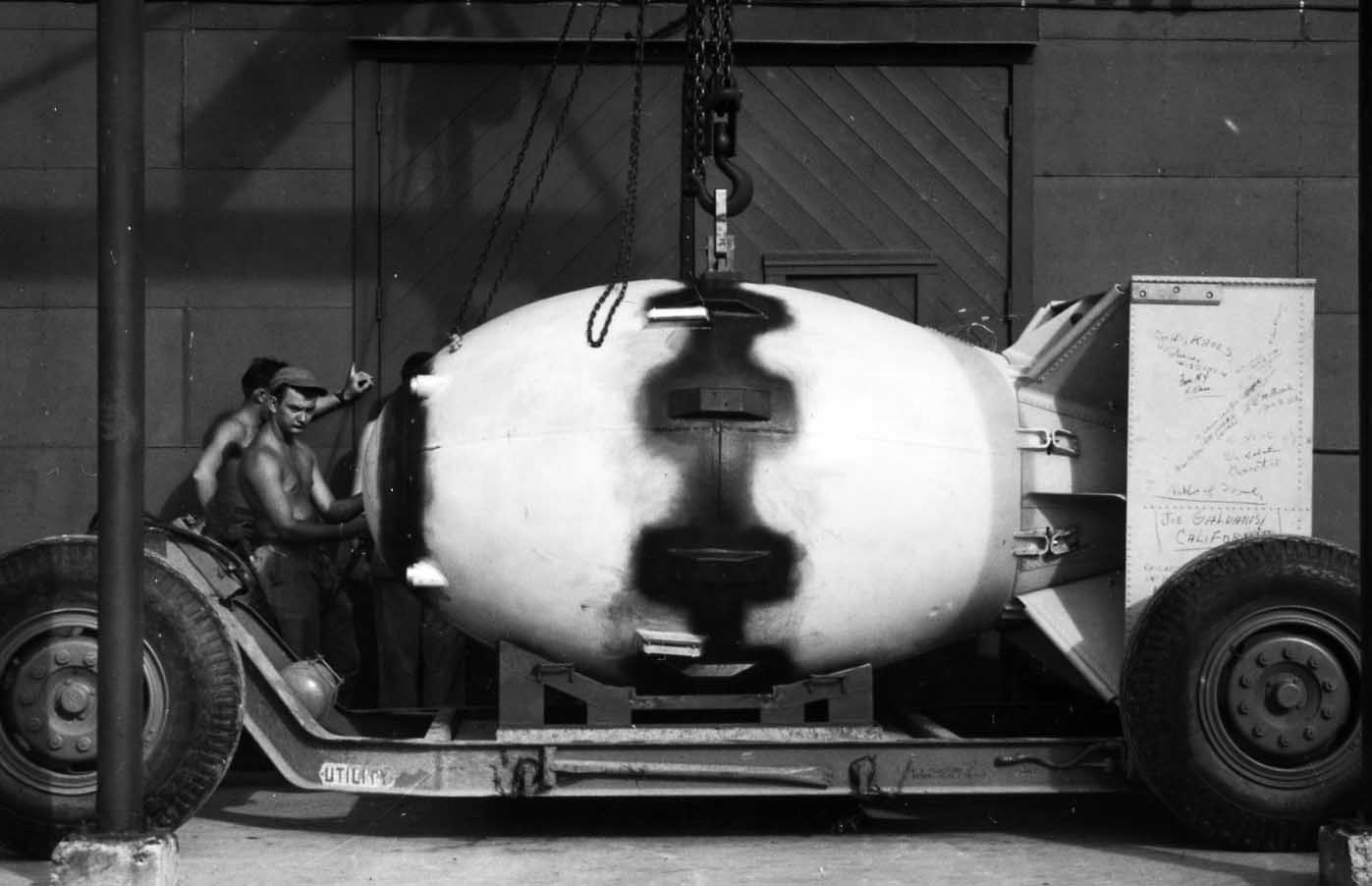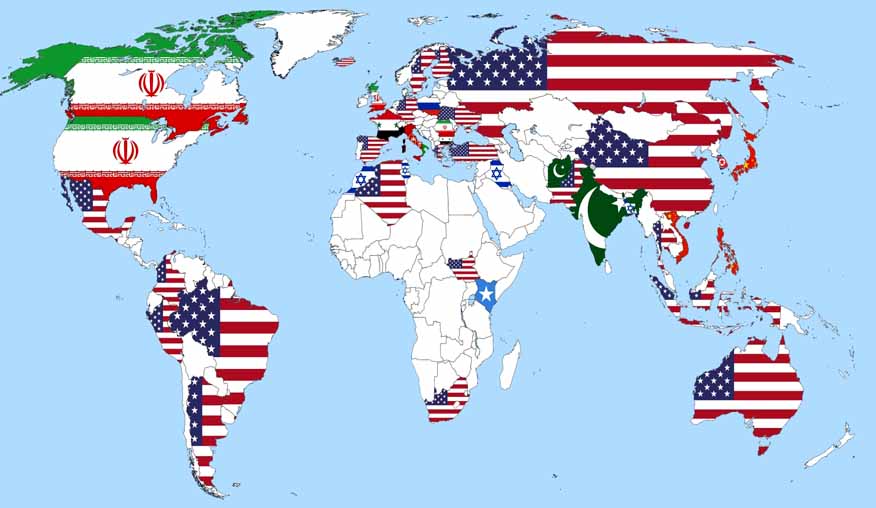Nagasaki bound. “Fat Man” on its way, August 1945
Three years ago, Global Research showed that interests backing Trident also finance Russia’s nuclear programme. This news, relayed a few months later by the Canary, should have caused a storm in anti-war circles. In fact few noticed. Debate around Trident continued to centre on whether it was (a) insurance against a credible threat, (b) worth a price tag in the hundreds of billions,1 (c) a diversion from more efficient uses of arms spend, or (d) intrinsically deranged.
That last comes closest to the truth, to be sure, but too few of those who see nuclear weapons as monstrous are taking in the full picture. That ‘deterrence’ industries operate to a rule book written by Catch-22’s Milo Minderbinder, aka the demented laws of capital accumulation, is an aspect lost from view when discussion is confined on the one hand to pragmatics, on the other to moral absolutes.2
Bear with me a moment. Back in the eighties, with the world again on the brink of realising its worst nightmare, Socialist Workers Party had the strap line, “Neither Washington nor Moscow”. Other left sects denounced this as a sop to popular sentiment created by market driven media in what Herman and Chomsky would later call the manufacture of opinion.
Those sects were no less dismissive than SWP of a USSR leadership they saw as freeloading on the property gains of 1917, but incapable of defending said gains against a Western imperialism that would never accept – could never accept, other than as a temporary setback – the closing off of one sixth of the world’s land mass to profit.
All the same, those left critics of SWP rejected the moral equivalence of ‘neither Washington nor Moscow’. This had many aspects but what matters here is that the natures of capitalism, and top-down economic planning,3 have radically different implications for their respective arms sectors.
Every dollar spent by the US on arms is:
- enabled by a unique advantage conferred by Bretton Woods and altered but in no way negated by Nixon’s 1971 removal of the dollar from gold parity4
- a boost to its distorted economy
- a transfer of wealth within the USA from the many to the few
- a means, with US military bases across the globe vastly outnumbering those of all other states combined, of enforcing its imperialist will, defined in the last analysis by the export of monopoly capital and repatriation of profits.
In stark contrast, every rouble spent on arms by the USSR was a drain on its economy. Indeed, forcing that economy to its knees via the diversion of labour values from industrial and welfare infrastructure to a spiralling arms race was an explicit goal of the Reagan era.
So what? The USSR is history. It is, but the arms industry of today’s Russia shares two striking features with its pre-1990 ancestor. First, it is largely under state control, which is not quite the same as being state funded – though it is that, and to a degree America’s pork barrel senators would denounce as communistical.5
Second, it continues to be a drain on the Russian economy, holding back the gains made since the departure of the drunken buffoon, Yeltsin. A drain on the economy. Think about that. Arms spend, in a sane world, bloody well should be a drain! That a Western public has ‘learned’ to accept arms for profit as normal and even desirable is of itself a pretty clear indicator of how far we’ve travelled the road of moral turpitude, and imbibed the logic of Alice in Wonderland.
Cue for my handing over to Eric Zuesse. Writing today in OffGuardian, he begins:
Unlike a regular corporation, the corporations that manufacture and sell weapons to their government are virtually 100% dependent upon their government and its military allies, for their own success; their markets are only those governments, not individuals (such as is the case for normal corporations).
Consequently, either their government will control them, and those firms won’t have any effective control over their own markets, or else those firms will, themselves, control their government, and thereby effectively control their markets, via the government’s foreign policies — not only via expanding its military alliances (those firms’ foreign markets), but via its designating ‘enemy’ nations that it and its ‘allies’ (those arms-producers’ foreign markets) can then use those weapons against.
In countries such as the United States, arms-producers are benefiting and controlled by the country’s billionaires, instead of (as in Russia, for example) benefiting and controlled by the government. These totally profit-driven arms-producers need to have market-nations that are called ‘allied’ governments, but they also need to have some target-nations that are called ‘enemy’ governments, so as to ‘justify’ more arms-production by these firms, against which to use these weapons. Only in nations where arms-producers are privately instead of publicly controlled are the government’s foreign polices predominantly controlled by the country’s arms-producers. That’s the way it is in America.
* * *
- Some trade unionists equate Trident to 30,000 jobs. Do the sums. CND puts Trident costs at £200bn. Divide by 30k, give each worker £6.6m and send her home. OK, CND may be inflating the figure (though such projects invariably come in over budget) but however we slice it the jobs argument for Trident is surreal.
- Speaking of moral absolutes, while nuclear weapons terrify me, in the here and now it would be madness for North Korea to ditch them, and madness for Iran not to make their acquisition a burning priority.
- “Soviet Union” was a misnomer. Stalin abolished the soviets – one of their functions being to inform responsive, bottom-up economic planning – in the late twenties.
- A summary of the significance of the 1945 Bretton Woods agreement, Nixon’s 1971 ending of the dollar gold standard and the 1973 arrival of petrodollars is given here, while in The Global Minotaur, Yanis Varoufakis sets out how – in the context of the need of all ruling classes not only to extract surplus value but to store and/or recycle it – postwar America became the first nation ever to make a state of permanent debt profitable.
- There are those in arms geek circles who say Russia makes better weapons – SAMS, tanks and small arms in particular – because their primary purpose is to deter and if necessary kill, whereas the primary purpose of armaments in the USA is, one way or another, to make profits.



Thanks Philip. I voted for Jeremy Corbyn and Corbynomics not the Labour Party. He promised us no to Trident(and NATO)and so much more but betrayed all of us who believed he would deliver on his promises. I left the Labour Party and momentum because of so many broken promises and will likely join the Green Party since their is no SEP rep. I haven’t got much faith in our so-called democracy as you will have no doubt gathered and Trident is for me the no brainer. Not sure if Eric is right to advise on Iran and N.Korea but the MAD is becoming more irrelevant when all it takes is phsychos and sociopaths strutting in brain dead posturising with apparently no off switch. I despair at witnessing this pantomime unfolding.
I get it Susan. I know others who have done the Labour to Green switch (some because they want JC to back a second EU referendum and seem not to have thought through the consequences of an outcome as wafer thin as polls suggest, especially if won by a hair’s breadth to Remain). At issue for me is not just that the Greens (like liberal parties outside Britain) have no links to organised labour. It’s that wherever they gain a degree of influence, as in states with PR, they act as other liberal parties do in nodding through neoliberal policies. Right now in the UK they make sense to many, me included, but isn’t that because they carry no responsibility? You’ll think me soft but whether judging right shifts by Greens in Europe, or Labour here, I see things impersonally. My joining Labour on JC’s election was a response not to him but the energy he unleashed, evidence that passivity in the face of ‘austerity’ had not been consent but disempowerment.
Labour always betrays, despite the sincerity of many members. Looked at historically, the task of leftwing Labour, regardless of subjective intent by honourable individuals, is to sanitise and renew the Party after each betrayal of the labour sellers. I see that as inevitable with any party not committed to ending capitalism itself.
Are you attributing to Eric my own views on Iran and North Korea? He doesn’t mention the latter, while his references to Iran aren’t about nuclear weapons. I’m simply making the observation that without nuclear weapons, states targeted by the US are vulnerable to regime change in the name of humanitarianism but in pursuit of goals less lofty.
Like you I despair. Frequently. But what can we do except, while we still draw breath, keep on keeping on?